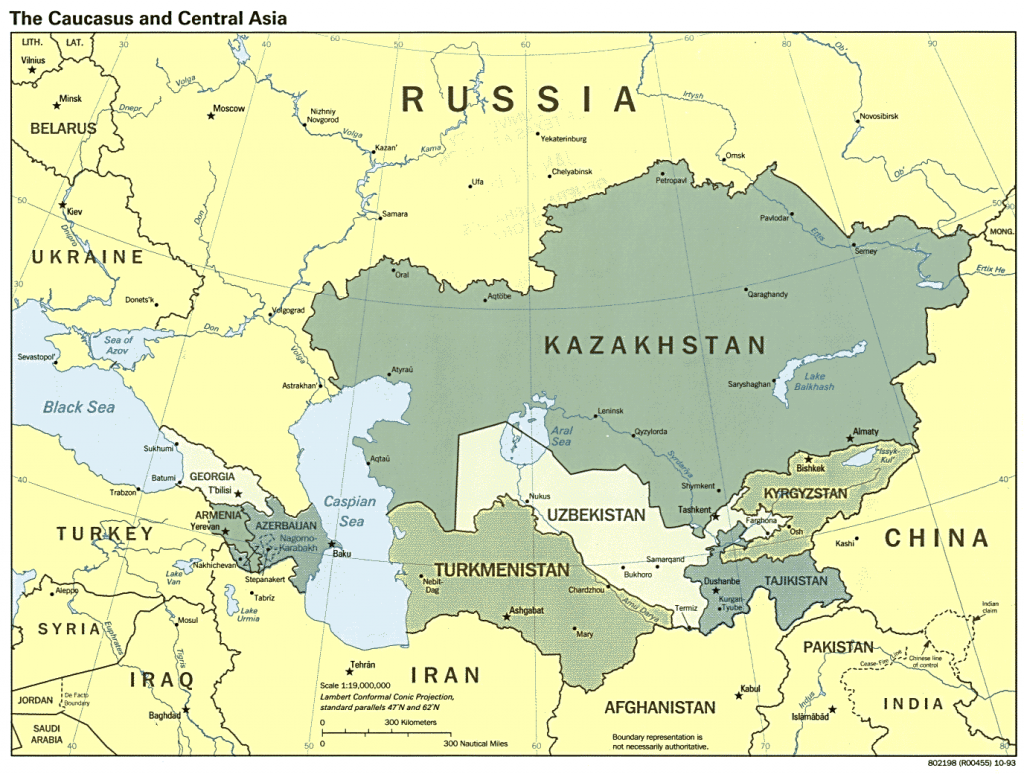
A Rússia enviou ontem, 06/01, tropas ao Cazaquistão para conter a crescente violência que tomou conta da população que se insurge contra o aumento do preço dos combustíveis. Esta é a primeira vez que manifestações deste tipo ocorrem no país. Os confrontos com as forças policiais já deixaram dezenas de mortos.
Moscou atendeu ao pedido do Presidente Kassym-Jomart Tokayev, que até a “renúncia” do ex-presidente Nursultan Nazarbayev, em 2019, ocupava o cargo de Primeiro-Ministro do país. Nazarbayev presidiu o Cazaquistão por quase três décadas, a partir de 1990, quando a dissolução da União Soviética criou um vácuo de poder em todas as suas ex-repúblicas – Cazaquistão, Turcomenistão, Quirguistão, Tajiquistão e Uzbequistão – e o desafio para a nova liderança, composta então por membros do KGB formados na cartilha de Moscou, de ter que tomar as rédeas das cinco repúblicas que, de supetão, se viram “órfãs”.
Neste contexto complexo, o grande dilema que se colocou para todos ao longo destes poucos trinta anos de autonomia tem sido encontrar uma fórmula que os libere dos “grilhões” russos e os insiram num mundo globalizante, sem espicaçar, entretanto, a ex-“madrinha”. Uns têm obtido maior êxito, como o Cazaquistão; outros, como o Tajiquistão, ainda se encontram enquistados na mesma liderança autocrata, do Presidente Emomali Rahmov, que assumiu o poder em 1994, logo após o recebimento do “espólio” de Moscou.
De comum, perdura a desconfiança de todos em “aceitar” um novo hegemon dentre eles que repita a experiência soviética. Por esta razão, as relações entre os cinco permanecem “distantes” malgrado o passado compartilhado. O elo de união – que tem sido explorado, aliás, pelos sauditas através de financiamentos para a reconstrução de mesquitas e madrassas -, é o da fé no Islã, que os anos de ateísmo marxista alijou da vida pública. Constatei isto com muita evidência quando servi na então-Astana, hoje renomeada Nursultan, a capital cazaque repaginada para demonstrar na contemporaneidade da sua arquitetura (sugiro que os amigos vejam as fotos) o compromisso da liderança cazaque com a modernidade e com o futuro autônomo.
Porém… nem tanto, ainda, a se julgar ao apelo de Tokayev a Vladimir Puntin para a Rússia intervir no conflito. Este, estrategicamente, decidiu fazê-lo através da “Organização do Tratado de Segurança Coletiva” (OTSC), organização militar intergovernamental criada, em 1992, pela Rússia, Armênia, Bielorússia, Cazaquistão e Tajiquistão, e formalizada em 2002, através do Tratado de Tashkent, conformando o que os analistas consideram como a “OTAN pós-soviética”. Evidentemente, trata-se de um álibi para os russos, posto que o grosso das tropas será por eles constituído. Os contingentes dos outros países, se os houver de forma significativa, não terão estofo para formar um exército plurinacional minimamente equilibrado. Ou seja, seria uma nova “invasão” russa, “a convite”, tal como ocorreu no Afeganistão, em 1971?
Várias questões se colocam neste contexto. A primeira seria o viés marcadamente étnico-religioso que o conflito pode assumir, à luz inclusive da experiência da URSS. A pergunta que não quer se calar é se a população cazaque, de maioria muçulmana – 72% – aceitaria novamente a chegada dos russos brancos e ortodoxos, uma vez que ela vem sorrateiramente afastando os seus remanescentes do serviço público, forçando-os, assim, a emigrar, por falta de emprego, e desta forma “recazaquistar” a sociedade.
Mas o principal desafio será a presença política dos russos no solo cazaque. Esta é, aliás, para mim, a razão da insistência de Moscou na conformação de um contingente plurinacional: uma justificativa para contrabalançar a repercussão internacional negativa da crise na fronteira com a Ucrânia (?). Os que tivemos a oportunidade de viver no Cazaquistão estamos conscientes da força do poder russo na região. Costumo dizer que a Rússia Imperial subsiste desde a época em que o centro político do território centralizou-se em Moscou. O vasto espaço hoje chamado “Rússia” cobre uma área cujos soberanos sempre tiveram convicção profunda da sua hegemonia sobre as tribos nômades da Ásia Central. A URSS foi apenas um capítulo, para mim, na longa história do Poder (com P maiúsculo) de Moscou. A União Soviética se esfacelou, mas o Kremlin permanece consciente da sua capacidade de irradiação, e no subconsciente, sobretudo, da vizinhança mais próxima.
E o Cazaquistão é peça-chave neste tabuleiro. O seu solo é imensamente rico em produtos minerais e combustíveis fósseis. O país possui as segundas maiores reservas mundiais de urânio, cromo, chumbo e zinco; o terceiro maior depósito de manganês; a quinta maior reserva de cobre; e está classificado entre os dez primeiros produtores de carvão, ferro e ouro do mundo. Ainda mais significativo, detém atualmente a 11ª maior reserva provada de petróleo e gás natural do planeta. E até agora tem sido governado por uma elite “progressista”, malgrado os preconceitos do Ocidente, orientada para inserir o país no século XXI, como atesta o Plano “Kazakhstan 2050”, que o governo estabeleceu com uma das principais metas para os próximos anos: malgrado o seu enorme depósito de combustíveis fósseis, fazer a transição para uma “economia verde”, em 2050.
Estas riquezas atiçam a ambição das grandes potências regionais, entre as quais a vizinha China, principalmente, que incluiu o país no corredor energético da “Belt and Road Initiative”, a “Nova Rota da Seda”, o projeto econômico hegemônico de Xi Jinping.
Um “front” russo, a sudoeste – Ucrânia – e um “front” russo, a sudeste – Cazaquistão : não seria um pouco excessivo para as ambições de Vladimir Putin?
Rússia… e China…?
To be (certamente) continued…
Sugiro aos amigos a leitura da matéria abaixo, que o Estadão publicou hoje:
https://internacional.estadao.com.br/noticias/geral,governo-do-cazaquistao-renuncia-apos-protestos-causados-por-aumento-no-preco-do-combustivel,70003941906?
Doutor em Direito Internacional Público em Paris. Ingressou na carreira diplomática em 1976, serviu nas embaixadas de Bruxelas, Buenos Aires, Nova Déli, Washington, Pequim, Tóquio, Islamabade (onde foi Embaixador do Brasil, em 2004). Também cumpriu missões transitórias no Vietnã e Taiwan. Viveu 15 anos na Ásia, para onde orientou sua carreira por considerar que o continente seria o mais importante do século 21 – previsão que, agora, vê cada vez mais perto da realidade.
